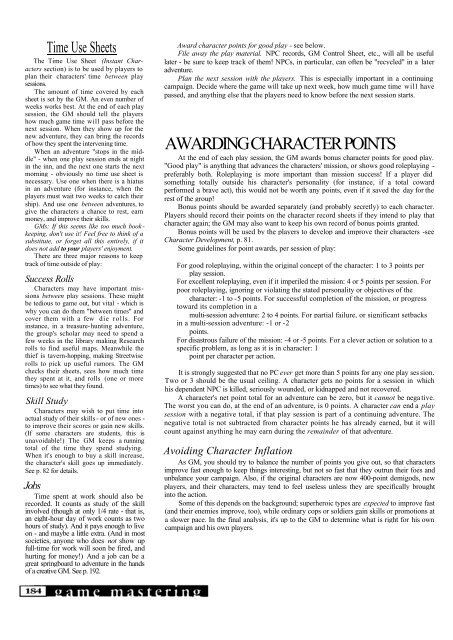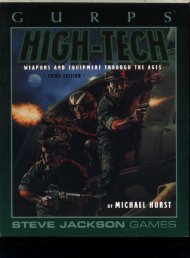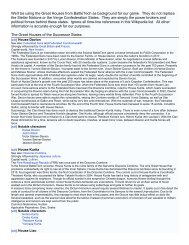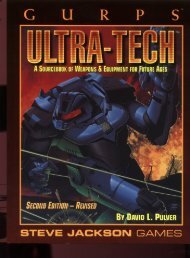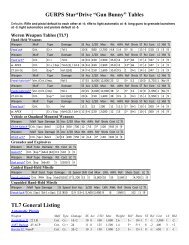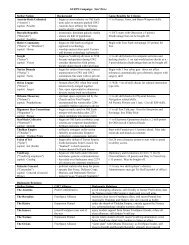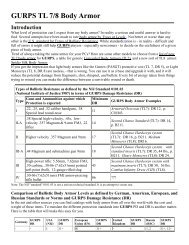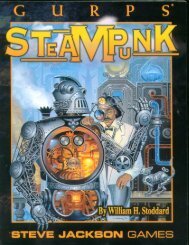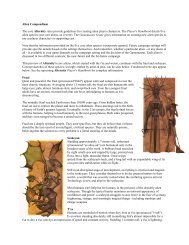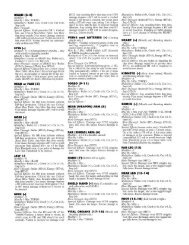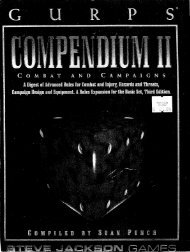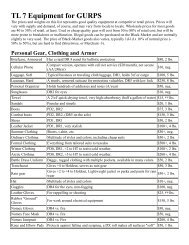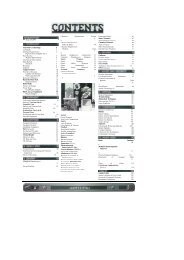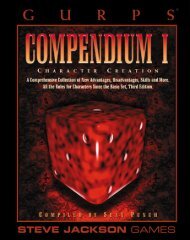Cheat! When all else fails, roll the dice where the players can't see - and then lieabout your roll. "It worked! You finally got the door open. You rush through, and slam itbehind you. The orcs cannot follow." When an "honest" roll will end the game in abloody massacre, a GM can be forgiven for cheating in the players' favor.One last note: There will come a time when the players insist on getting themselveskilled - through gross carelessness, total stupidity, or even (we can hope) good roleplaying,right down to the bitter end. You can't rescue them every time . . . that's no fun, either!If they really ask for trouble, let them have it. So it goes.Game TimeGame time is the time that passes in the game world. The GM is the judge of howmuch time has passed.Time During AdventuresCombat is played out in "slow" time. One combat turn equals one second. It maytake a minute or so for each combat turn, especially if players are inexperienced or thebattle is a large one. But combat is usually a life-or-death situation, and you need togive players time to think.Conversations, attempts to pick locks, attempts to escape from traps, and similarsituations are played in "real" time. If the players spend ten minutes discussing how tobest approach an NPC merchant . . . their characters spent ten minutes talking outside theshop.Routine travel, etc., is handled in "fast" time. When the party is walking along atrail, for instance, the GM can simply skip the time between encounters: "You walk foranother two hours, and then, coming toward you, you see two young women withlong poles . . ." Tell the players when they meet someone, when they come into a town, orwhen night falls. Just compress the rest of the time. Under some circumstances - a longocean or space voyage, for instance - the GM could compress months of non-eventfultime into "Nothing happens until July unless you make it happen yourself." This is agood time for the characters to dream up some interesting deviltry, or fill out a few TimeUse Sheets for study and self-improvement.Between AdventuresIf you are running a continuing campaign (see p. 199), you also need to keep track oftime between adventures, so characters can study, travel and age. This can always be thesame amount of time, or the GM and the players can simply agree on a "logical" timeto pass between the end of one adventure and the beginning of the next. It is often a goodidea to let a month or two go by, to allow time for healing, earning money at "ordinary"jobs, and study of new skills - see Time Use Sheets, p. 184.Or you can let X days of real time equal one day of game time, all the time. Thus, if Xis 7, one day equals one week. If it has been seven days since your last adventure,seven weeks have automatically gone by in the game world.Of course, no game time at all has to pass between sessions, if you can't finish anadventure in one session. If. when you quit play, the party has just confronted a rampagingTyrannosaurus. that Tyrannosaurus will get no closer in the real-world week before youcan play again.ENDING A PLAY SESSIONAt the end of each play session, the GM should do the following:Discuss the adventure with the players. What went right, and what went wrong, andwhy? If the session was part of a continuing campaign, the GM should be careful not togive away any secrets.The Cinematic CampaignFor the most part, these rules stressrealism. Characters can get disappointed,injured, sick, or even dead. So it goes. TheGM is expected to stretch reality in anemergency (defined as "whenever realitywould ruin the game"). But the rest of thetime, reality rules.But (in the words of the sage): What isreality? Many people prefer to game outthe "reality" of the cinema, where theheroes battle dozens of foes and emergeunscathed. Don't try that at home ...In a cinematic campaign, PCs shouldstart at 200 points, rather than just 100. Tomaintain some touch with reality, PCs maynot spend more than 150 points on theirbasic attributes; the rest must go into skillsand advantages. Toughness, Luck andCombat Reflexes are especially appropriatecinematic advantages!And for GMs who prefer this version ofreality, here are two "official" alternaterules to use. Be sure to tell the players inadvance if you're adopting CinematicReality!Flesh WoundsAny time when combat is not actuallygoing on, any PC can be healed back tofull HT by spending a character point (PCsshould keep a few unspent points for thispurpose.) "Zounds! It was only a fleshwound!"Against All Odds'Ten of us to a hundred of them, eh?Well, one British soldier is worth twentyof those beggars ... so the odds are two toone in our favor. Hardly sporting!"In a cinematic campaign, characters gettwice the "standard" number of Parries andBlocks each turn; thus, for instance, asword can parry twice per turn and a fencingweapon four times. Only one defense isallowed per attack unless Ail-OutDefense is chosen. Weapons which requirere-readying after a parry may still parryonly once! This rule will normally work inthe PCs' favor, since they will be attackedby dozens of unskilled foes who, in a coldlyrealistic world, would swamp them withsheer numbers.
Time Use SheetsThe Time Use Sheet (Instant Characterssection) is to be used by players toplan their characters' time between playsessions.The amount of time covered by eachsheet is set by the GM. An even number ofweeks works best. At the end of each playsession, the GM should tell the playershow much game time will pass before thenext session. When they show up for thenew adventure, they can bring the recordsof how they spent the intervening time.When an adventure "stops in the middle"- when one play session ends at nightin the inn, and the next one starts the nextmorning - obviously no time use sheet isnecessary. Use one when there is a hiatusin an adventure (for instance, when theplayers must wait two weeks to catch theirship). And use one between adventures, togive the characters a chance to rest, earnmoney, and improve their skills.GMs: If this seems like too much book -keeping, don't use it! Feel free to think of asubstitute, or forget all this entirely, if itdoes not add to your players' enjoyment.There are three major reasons to keeptrack of time outside of play:Success RollsCharacters may have important missionsbetween play sessions. These mightbe tedious to game out, but vital - which iswhy you can do them "between times" andcover them with a few die rolls. Forinstance, in a treasure-hunting adventure,the group's scholar may need to spend afew weeks in the library making Researchrolls to find useful maps. Meanwhile thethief is tavern-hopping, making Streetwiserolls to pick up useful rumors. The GMchecks their sheets, sees how much timethey spent at it, and rolls (one or moretimes) to see what they found.Skill StudyCharacters may wish to put time intoactual study of their skills - or of new ones -to improve their scores or gain new skills.(If some characters are students, this isunavoidable!) The GM keeps a runningtotal of the time they spend studying.When it's enough to buy a skill increase,the character's skill goes up immediately.See p. 82 for details.JobsTime spent at work should also berecorded. It counts as study of the skillinvolved (though at only 1/4 rate - that is,an eight-hour day of work counts as twohours of study). And it pays enough to liveon - and maybe a little extra. (And in mostsocieties, anyone who does not show upfull-time for work will soon be fired, andhurting for money!) And a job can be agreat springboard to adventure in the handsof a creative GM. See p. 192.Award character points for good play - see below.File away the play material. NPC records, GM Control Sheet, etc., will all be usefullater - be sure to keep track of them! NPCs, in particular, can often be "recycled" in a lateradventure.Plan the next session with the players. This is especially important in a continuingcampaign. Decide where the game will take up next week, how much game time will havepassed, and anything else that the players need to know before the next session starts.AWARDING CHARACTER POINTSAt the end of each play session, the GM awards bonus character points for good play."Good play" is anything that advances the characters' mission, or shows good roleplaying -preferably both. Roleplaying is more important than mission success! If a player didsomething totally outside his character's personality (for instance, if a total cowardperformed a brave act), this would not be worth any points, even if it saved the day for therest of the group!Bonus points should be awarded separately (and probably secretly) to each character.Players should record their points on the character record sheets if they intend to play thatcharacter again; the GM may also want to keep his own record of bonus points granted.Bonus points will be used by the players to develop and improve their characters -seeCharacter Development, p. 81.Some guidelines for point awards, per session of play:For good roleplaying, within the original concept of the character: 1 to 3 points perplay session.For excellent roleplaying, even if it imperiled the mission: 4 or 5 points per session. Forpoor roleplaying, ignoring or violating the stated personality or objectives of thecharacter: -1 to -5 points. For successful completion of the mission, or progresstoward its completion in amulti-session adventure: 2 to 4 points. For partial failure, or significant setbacksin a multi-session adventure: -1 or -2points.For disastrous failure of the mission: -4 or -5 points. For a clever action or solution to aspecific problem, as long as it is in character: 1point per character per action.It is strongly suggested that no PC ever get more than 5 points for any one play ses sion.Two or 3 should be the usual ceiling. A character gets no points for a session in whichhis dependent NPC is killed, seriously wounded, or kidnapped and not recovered.A character's net point total for an adventure can be zero, but it cannot be nega tive.The worst you can do, at the end of an adventure, is 0 points. A character can end a playsession with a negative total, if that play session is part of a continuing adventure. Thenegative total is not subtracted from character points he has already earned, but it willcount against anything he may earn during the remainder of that adventure.Avoiding Character InflationAs GM, you should try to balance the number of points you give out, so that charactersimprove fast enough to keep things interesting, but not so fast that they outrun their foes andunbalance your campaign. Also, if the original characters are now 400-point demigods, newplayers, and their characters, may tend to feel useless unless they are specifically broughtinto the action.Some of this depends on the background; superheroic types are expected to improve fast(and their enemies improve, too), while ordinary cops or soldiers gain skills or promotions ata slower pace. In the final analysis, it's up to the GM to determine what is right for his owncampaign and his own players.
- Page 3 and 4:
17. FLIGHT.........................
- Page 5 and 6:
Materials Needed for PlayThe GURPS
- Page 7 and 8:
WHAT IS ROLEPLAYING?A roleplaying g
- Page 9 and 10:
Character TypesThere are no "charac
- Page 12 and 13:
Four numbers called "attributes" ar
- Page 14 and 15:
You are free to set the physical ap
- Page 16 and 17:
REPUTATIONSome characters are so we
- Page 18 and 19:
These are character traits that are
- Page 20 and 21:
Legal Enforcement Powers 5, 10 or 1
- Page 22 and 23:
Rapid Healing5 pointsThis advantage
- Page 24 and 25:
A minor deity as Patron to a travel
- Page 26 and 27:
ReputationVariable (see p. 17)Socia
- Page 28 and 29:
Lame-15,-25, or -35 pointsYou have
- Page 30 and 31:
Bad Temper-10 pointsYou are not in
- Page 32 and 33:
Dyslexia-5 or -15 pointsYou have a
- Page 34 and 35:
Pacifism-15 or -30 pointsYou are op
- Page 36 and 37:
Shyness-5,-10,-15 pointsYou are unc
- Page 38 and 39:
You have a significant responsibili
- Page 40 and 41:
A "quirk" is a minor personality tr
- Page 42 and 43:
SpecializingRequired Specialization
- Page 44 and 45:
MEANING OF SKILL LEVELSSo you have
- Page 46 and 47:
Teamster (Mental/Average)Defaults t
- Page 48 and 49:
Skiing (Physical/Hard)Defaults to D
- Page 50 and 51:
Guns/TL (Physical/Easy)Defaults to
- Page 52 and 53:
Any of these skills can be self-tau
- Page 54 and 55:
Levels of Language SkillThis table
- Page 56 and 57:
Most outdoor skills can be learned
- Page 58 and 59:
PSIONIC SKILLSThese are special men
- Page 60 and 61:
Forensics/TL (Mental/Hard)Defaults
- Page 62 and 63:
Few Hundred Acres: Knowledge of far
- Page 64 and 65:
Many skills in this category are ta
- Page 66 and 67:
Lockpicking/TL (Mental/Average) Def
- Page 68 and 69:
Gunner/TL See Combat Skills, p. 50M
- Page 70 and 71:
Now you need to decide what equipme
- Page 72 and 73:
Each suit of "real" armor includes
- Page 74 and 75:
Listing Weapons On Your Character S
- Page 76 and 77:
Recording Encumbrance on YourCharac
- Page 78 and 79:
Passive Defense. The first blank is
- Page 80 and 81:
The longer (and the more skillfully
- Page 82 and 83:
When you improve a skill, the cost
- Page 84 and 85:
Not all the advantages and disadvan
- Page 86 and 87:
But remember . . . some skills have
- Page 88 and 89:
ClimbingTo climb anything more diff
- Page 90 and 91:
SwimmingThe Swimming skill (p. 49)
- Page 92 and 93:
WILL ROLLSWhen a character is faced
- Page 94 and 95:
The GURPS combat system is designed
- Page 96 and 97:
WaitDo nothing unless a foe comes w
- Page 98 and 99:
You may only block one attack per t
- Page 100 and 101:
Missile WeaponsMissile weapons are
- Page 102 and 103:
At the end of your move, if you hav
- Page 104 and 105:
The rules for attacking a foe are e
- Page 106 and 107:
tell you how long it will take. In
- Page 108 and 109:
You may normally parry only one att
- Page 110 and 111:
CLOSE COMBATUsing the Move, Step an
- Page 112 and 113:
(adjusted) ST! Note that a shield h
- Page 114 and 115:
Ranged Weapon StatsFor each ranged
- Page 116 and 117:
second. On the table, this rounds u
- Page 118 and 119:
If you are using the "hit location"
- Page 120 and 121:
Removing or folding the stock of a
- Page 122 and 123:
After the initial "freeze" ends, ea
- Page 124 and 125:
ATTACKING INANIMATE OBJECTSThere ar
- Page 126 and 127:
This subtraction will mostoften aff
- Page 128 and 129:
Psionic healing (p. 175) and magica
- Page 130 and 131:
DrowningSee the rules for Swimming,
- Page 132 and 133: protects completely. Toughness prot
- Page 134 and 135: Resolving mounted or vehicular comb
- Page 136 and 137: Using Ranged Weapons From Horseback
- Page 138 and 139: This section covers special rules f
- Page 140 and 141: HT: Health and Hit PointsFor a roug
- Page 142 and 143: Swarm AttacksA group of small creat
- Page 144 and 145: Encumbrance and MovementEncumbrance
- Page 146 and 147: A critical miss means the energy co
- Page 148 and 149: oll will not end the spell, but the
- Page 150 and 151: If the subject makes the resistance
- Page 152 and 153: won't work. If anyone but the caste
- Page 154 and 155: ANIMAL SPELLSThese are the spells r
- Page 156 and 157: If the summoning spell is repeated,
- Page 158 and 159: Cost: 1 for an object up to the siz
- Page 160 and 161: Armor EnchantmentsThese spells work
- Page 162 and 163: AuraInformationShows the caster a g
- Page 164 and 165: Psionics, or "psi" abilities, are p
- Page 167 and 168: GlossaryESP - Extra-Sensory Percept
- Page 169 and 170: Psionics and MagicMagic and psionic
- Page 171 and 172: PSYCHOKINESISThis power covers movi
- Page 173 and 174: Pside EffectsPsi skills can have "s
- Page 175 and 176: Limitations(Continued)Fickle: varia
- Page 177 and 178: Player-Made MapsWhenever the player
- Page 179 and 180: Predetermined ReactionsCertain NPCs
- Page 181: Dealing with the PlayersArgumentsAs
- Page 185 and 186: Weapons and Armor0. Fists and stone
- Page 187 and 188: Weather(Continued)WindWinds from ga
- Page 189 and 190: Gold and SilverA traditional assump
- Page 191 and 192: JobsThe jobs available in each game
- Page 193 and 194: Job (Prerequisites), Monthly Income
- Page 195 and 196: Sooner or later, every GM wants to
- Page 197 and 198: Features of a GoodAdventureA good a
- Page 199 and 200: World-BuildingA game world is a com
- Page 201 and 202: CRITICAL HIT TABLEAll doublings or
- Page 203 and 204: When the players meet an NPC whose
- Page 205 and 206: Weapons are listed in groups, accor
- Page 207 and 208: MODERN AND ULTRA-TECH WEAPONSWeapon
- Page 209 and 210: ANCIENT/MEDIEVAL ARMORUse this tabl
- Page 211 and 212: FANTASY/MEDIEVAL EQUIPMENTThe follo
- Page 231 and 232: After eight printings of the GURPS
- Page 233 and 234:
of Divination should match the "fla
- Page 235 and 236:
Minor disadvantage: -5 points. Agai
- Page 237 and 238:
Whether through an accident of birt
- Page 239 and 240:
Note that this disadvantage is inco
- Page 241 and 242:
SKILLSARTISTIC SKILLSVideo Producti
- Page 243 and 244:
traders, and chess-like games are c
- Page 245 and 246:
If, during an adventure, a philosop
- Page 247 and 248:
VITAL ORGANSThese are optional rule
- Page 256 and 257:
INSTANT CHARACTERSThis quick refere


